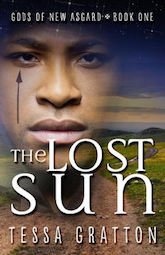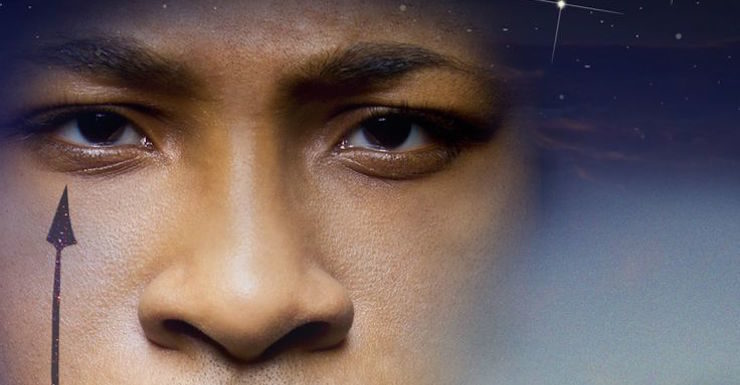It’s well on the way into winter in the northern hemisphere, and in these chilly damp days, curling up near a daylight-spectrum lamp with a good book seems like the best of all possible choices. But which book? As is often the case, my shelves are groaning under the weight of so many options that choosing between them is a complicate exercise, and my anticipation for reading Maggie Shen King’s An Excess Male wars with my desire to read E.K. Johnston’s That Inevitable Victorian Thing fights with the prospect of reading Molly Tanzer’s Creatures of Will and Temper, while Silvia Moreno-Garcia’s The Beautiful Ones and Annalee Newitz’s Autonomous and Anna-Marie McLemore’s When The Moon Was Ours lurk tantalisingly in wait. And that’s only the start.
Tessa Gratton’s The Lost Sun came across my radar thanks to a Twitter recommendation by Leah Bobet. The first volume of the Gods of New Asgard series, it takes place in a world recognisably similar to our own, but one where the initials U.S.A. stand for “United States of Asgard,” where gods and valkyries and prophets are an intrinsic part of the political process, and trolls roam the landscape. It didn’t sound at all like my sort of thing—but it turns out it’s really great.
Buy the Book


The Lost Sun (Gods of New Asgard Book 1)
Soren Bearskin is the son of a famous berserker warrior who went to prison after killing several civilians in a fit of battle-frenzy. Soren’s inherited his father’s berserker power: constant fevers and insomnia hold the promise that one day it’ll come on him and he won’t be able to control himself. He’s terrified of his potential for violence, of the danger within him. When the god Baldur disappears, Odin promises a boon to anyone who brings him news of his beloved son. Soren wants that boon in order to be fear of berserking, and together with Astrid Glyn, a youthful seer who’s dreamed of Baldur’s location, he sets off on a roadtrip across the U.S.A. But fate has more plans in store for Soren — and for Astrid — than they imagined.
The Lost Sun is enormously entertaining. (It has a punk-rock Fenris Wolf in the body of a young woman, Valkyries who appear on television, and the holmgang as a means of settling disputes both large and small. And trolls. I rather like the trolls. They are appropriately frightening.) It’s also a remarkably kind book, a book about coming to terms with who you are, about learning find hope and light and friendship, about trust and fate and sacrifice. In the end, despite everything, it’s an uplifting book, and I really want to read more like it. I’m looking forward to checking out the rest of the series.
I recently read a couple of books I didn’t love, too. That’s not to say they’re not well done: they didn’t work for me, but they may well appeal to the wide range of people who have different tastes!
Liz Ziemska’s Mandelbrot the Magnificent is a brief novella about mathematician Benoît Mandelbrot as a youth in France under the Nazi occupation, and how he combines mathematics and the Kabbalah to try to hide his family. Mandelbrot’s a bit of an arrogant child when it comes to mathematics, but Ziemska’s prose is skilled, and the text is enlivened by mathematical diagrams.
E.J. Swift’s Paris Adrift is a bewildering, fractal, disconnected story of time travel, addiction, bar life, and saving the future. It’s not a book I could connect to very easily. But its characters are vivid, and its scenes of Paris bar life are filled with incident. I’m not entirely sure I follow the time travel plots at all, but Swift seems to be having fun with her work.
What are you all reading lately?
Liz Bourke is a cranky queer person who reads books. She holds a Ph.D in Classics from Trinity College, Dublin. Her first book, Sleeping With Monsters, a collection of reviews and criticism, is out now from Aqueduct Press. Find her at her blog, where she’s been known to talk about even more books thanks to her Patreon supporters. Or find her at her Twitter. She supports the work of the Irish Refugee Council and the Abortion Rights Campaign.










